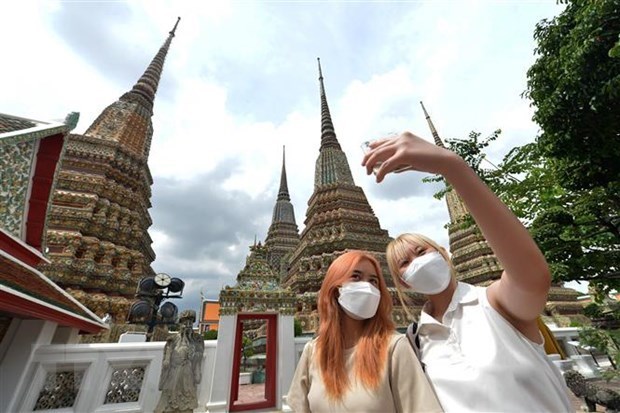Visitors to Thailand no longer required to undergo testing upon arrival from May
Fully vaccinated visitors to Thailand will no longer be required to take RT-PCR tests upon arrival as from May 1, the country’s Centre for COVID-19 Situation Administration (CCSA) announced on April 22.
 |
| Tourists take a photo at a pagoda in Bangkok, Thailand. (Photo: Xinhua/VNA) |
They are still recommended to take a self Antigen Test Kit (ATK), or as Rapid Antigen Test, on the fifth day of their arrival.
Since the beginning of April, foreign visitors and Thai nationals returning from abroad did not need to take RT-PCR tests before departing, but they still need to undergo this test upon arrival, including those who have been fully vaccinated.
After chairing the CCSA meeting, Prime Minister Prayut Chan-o-cha said Thailand’s tourism sector is recovering, and rapid antigen test will be more convenient and faster for foreign visitors.
"Many countries are relaxing travel restrictions significantly and our country depends considerably on tourism to support our economy," the prime minister said.
CCSA spokesman Taweesilp Visanuyothin later said that also from May 1 there would be no Test & Go entry scheme. The government would have different measures for vaccinated and unvaccinated foreign arrivals by air.
The CCSA also announced several other changes to pandemic prevention requirements for arrivals the same day, including reducing the required insurance coverage to 10,000 USD and granting entry to unvaccinated visitors, providing they show a negative pre-departure PCR result.
On April 22 morning, Thailand reported 21,808 new cases of COVID and 128 related deaths in the previous 24 hours, raising the national caseload to 4,128,038 and total fatalities to 27,520.
As of April 21, the country had administered 132.09 million doses of COVID-19 vaccine, with 80.6 percent of the population receiving one shot, 73.1 percent two shots and 36.2 percent booster shots.
Source: VNA